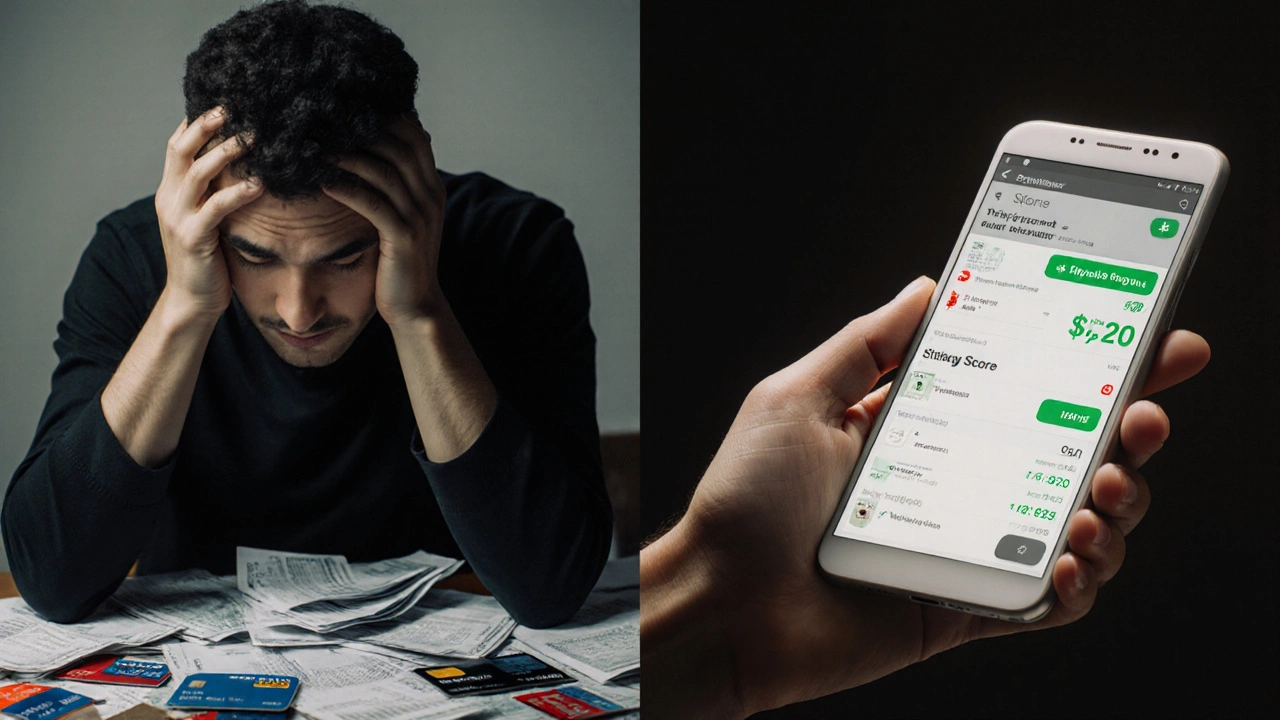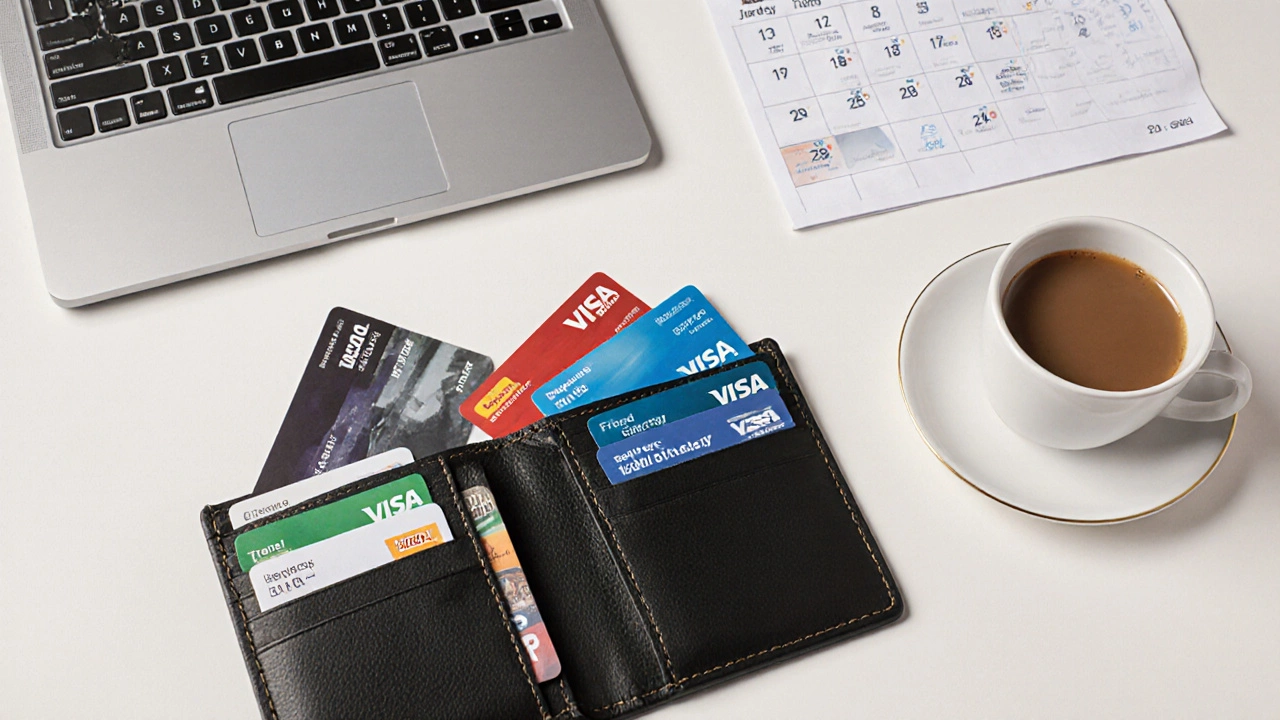Credit Card Management Calculator
Calculate Your Credit Card Health
See if your credit card strategy is helping or hurting your score
Results
Credit Utilization Rate
Annual Fee Impact
Management Health
Having four credit cards doesn’t automatically mean you’re in trouble. But it also doesn’t mean you’re doing it right. The real question isn’t how many cards you have-it’s how you use them. Too many people think more cards = more rewards or better credit. That’s a myth. What actually moves the needle is control, timing, and honesty with your spending.
Why People Stack Up Credit Cards
Most people start with one card for emergencies or groceries. Then comes the sign-up bonus. A 50,000-point offer on a travel card. A 0% APR for 18 months on a balance transfer. Then another for cash back on gas. Before you know it, you’ve got four cards in your wallet-and no clear plan for any of them.It’s not the cards themselves that cause problems. It’s the lack of strategy. In Ireland, the average adult holds 2.3 credit cards, according to the Central Bank. That means four is above average. But average isn’t always safe. What matters is whether those cards are working for you-or if they’re just sitting there, quietly eating your financial energy.
How Credit Cards Affect Your Score
Your credit score doesn’t care how many cards you have. It cares about how much you owe compared to what you can borrow. That’s called credit utilization. If you have €10,000 in total credit limits and you’re carrying €8,000 in balances, your utilization is 80%. That’s bad. Even if you have four cards, if each one is maxed out, your score will drop.But if you have four cards with €25,000 total credit and you only spend €3,000 a month? That’s 12% utilization. That’s excellent. The magic number? Stay under 30%. Under 10% is even better. Your score won’t care if you have one card or ten-if you keep your spending low and pay on time, your credit will grow.
Another myth: closing old cards helps. It doesn’t. Closing a card shrinks your total available credit. That can spike your utilization rate. And it shortens your credit history. The length of your credit history makes up 15% of your score. If you close your first card from 2018, you lose seven years of history overnight.
When Four Cards Make Sense
There are real situations where having four cards isn’t just okay-it’s smart.- You use one card for groceries (5% cash back), another for fuel (4% back), a third for travel (2 miles per euro), and a fourth for emergencies (0% intro APR). Each has a clear job.
- You pay off the full balance every month. No interest. No debt roll-over.
- You track every purchase with a budgeting app. No surprises.
- You’ve never missed a payment in five years.
People who do this well often have credit scores above 800. They’re not rich. They’re just organized. In Dublin, I’ve seen teachers, nurses, and freelancers manage four cards without stress. They don’t chase bonuses. They don’t open new cards every quarter. They stick to what works.

The Hidden Costs of Too Many Cards
Four cards sound great until you start paying for them.- Annual fees: One card might charge €120 a year for travel insurance and airport lounge access. Another might charge €75 for concierge service. That’s €195 gone before you even swipe.
- Time cost: Managing four due dates. Tracking rewards. Checking for fraud. Setting up auto-pay for each. That’s 30+ minutes a month. Multiply that by a year. It adds up.
- temptation: More cards = more spending power. Studies from University College Dublin show that people with multiple cards spend 18% more on average than those with one or two.
- Application hits: Every time you apply for a new card, it’s a hard inquiry. Four hard inquiries in a year can knock 15-20 points off your score. That’s enough to lose a mortgage rate.
And if you’re not careful, one missed payment on one card can drag down your whole credit profile. Lenders don’t look at your best card. They look at your worst.
Signs You Have Too Many
Ask yourself these questions:- Do you forget which card you used last week?
- Do you ever pay more than the minimum?
- Have you opened a new card in the last six months just because you got a bonus?
- Do you feel anxious when you open your bank app?
- Do you have more than one card with an annual fee you don’t use?
If you answered yes to two or more, you might be holding too many. It’s not about the number. It’s about the noise.

What to Do If You’re Overloaded
You don’t need to close everything at once. That can hurt your score. Instead:- Make a list of all your cards: name, limit, fee, rewards, due date.
- Identify the one you use least. That’s your first candidate.
- Wait until you’ve paid off any balance on it.
- Call the issuer. Ask if you can downgrade to a no-fee version instead of closing it. Many banks let you switch cards without losing your credit history.
- Only close the card if it has no annual fee and you’ve had it less than two years.
Keep your oldest card open-even if it has a low limit. That’s your credit history anchor.
What to Do If You Want to Add One More
If you’re thinking about opening a fifth card, pause. Ask: What problem is this solving?- Is there a new card offering 70,000 points for spending €5,000 in three months? That’s tempting. But if you can’t spend that much without going into debt, it’s not worth it.
- Are you trying to chase a better rewards rate? Check your current cards first. Maybe you’re missing a category bonus you already qualify for.
- Is your credit score above 780? If not, wait. You’re more likely to get approved-and get better terms-when your score is strong.
Don’t open a card because your friend did. Don’t open one because the ad says "limited time offer." Open one because it solves a real need. And if you can’t name that need, you don’t need the card.
Bottom Line
Four credit cards aren’t too many if you treat them like tools-not toys. They’re useful when you control them. Dangerous when they control you.The best credit card strategy isn’t about having the most. It’s about having the right ones-and using them without thinking about them. Pay in full. Track spending. Keep utilization low. Never miss a payment. If you’re doing that, four cards won’t hurt you. They’ll help you earn rewards, build credit, and sleep better at night.
If you’re not doing that? Then even one card is too many.
Is it bad to have four credit cards?
No, having four credit cards isn’t inherently bad. What matters is how you use them. If you pay off your balances every month, keep your total credit utilization under 30%, and never miss a payment, four cards can actually help your credit score. The problem isn’t the number-it’s mismanagement.
Will having four credit cards hurt my credit score?
Only if you misuse them. Opening multiple cards in a short time can lower your score due to hard inquiries. Carrying high balances increases your credit utilization, which hurts your score. Closing old cards can shorten your credit history. But if you manage them responsibly-low spending, full payments, no late fees-your score will improve over time.
Should I close a credit card I don’t use anymore?
Usually, no-not right away. Closing a card reduces your total available credit, which can raise your credit utilization rate. It also shortens your credit history if it’s one of your oldest accounts. Instead, consider downgrading it to a no-fee version. That keeps the account open and your credit history intact. Only close it if it has an annual fee you’re not using and you’ve had it for less than two years.
How many credit cards is too many?
There’s no magic number. Some people manage 10 cards successfully. Others struggle with two. The real limit is your ability to track them. If you’re forgetting due dates, paying fees you don’t use, or spending more because you have more credit, then you have too many. Quality of management matters more than quantity.
Can I get approved for a fifth credit card if I already have four?
Possibly-but only if your credit score is strong (above 780), your income supports it, and your current cards have low balances. Banks look at your debt-to-income ratio and payment history. If you’ve missed payments or have high utilization, approval is unlikely. Don’t apply unless you’re sure you’ll be approved. Each application lowers your score slightly.
